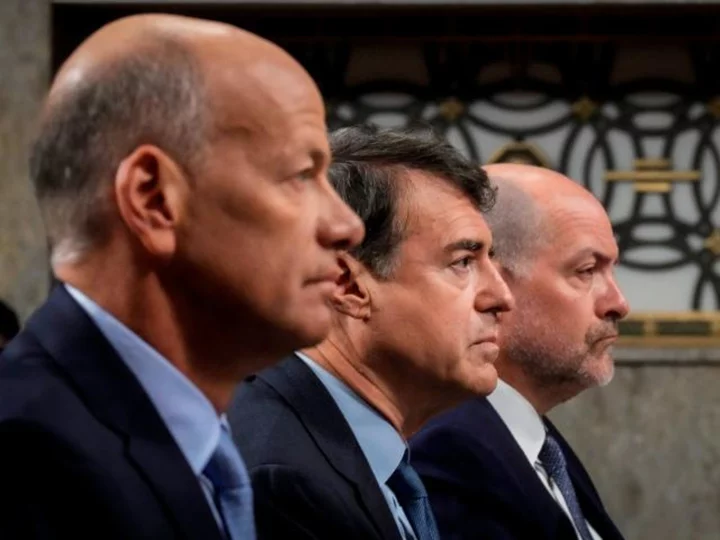More than two months after the collapse of Silicon Valley Bank and Signature Bank triggered a financial earthquake, three former executives spoke publicly for the first time in testimony before a Senate committee Tuesday.
Their takeaway from the experience of watching their companies crumble under their feet: Everyone screwed up but us.
Here's the deal: Lawmakers on the Senate Banking Committee were unusually united in their contempt for the way the three men — Greg Becker of SVB, as well as Scott Shay and Eric Howell of Signature — failed to mitigate risks and raked in millions in compensation while their banks imploded.
The grilling from senators lasted just over two hours. The Fed's top banking watchdog was also on the Hill, along with other regulators, testifying in the House as part of his semiannual obligation. Unsurprisingly, the banking crisis came up.
Here are the key takeaways from the Senate hearing:
Everyone else messed up
The executives conducted a masterclass in deflecting blame for their banks' failures.
To hear Becker tell it, Silicon Valley Bank was the victim of a collision of unprecedented rate hikes from the Federal Reserve, a bit of bad press and a social media panic.
In his testimony, Becker said he was "truly sorry" for the bank's collapse, blaming a "series of unprecedented events."
He noted that SVB had been compared to Silvergate — a crypto-focused Southern California lender that announced its liquidation days before SVB collapsed — and that news reports and investors wrongly lumped the two banks together.
"Rumors and misconceptions spread quickly online," sparking the bank run, Becker told lawmakers.
And of course, Becker says, the Fed raised interest higher and faster than expected, even though inflation was supposed to be "transitory."
But did the CEO of the bank do anything wrong that might have contributed to its instability? Becker said he couldn't think of anything.
Lawmakers were incredulous.
"It sounds a lot like my dog ate my homework," said Democratic Sen. Sherrod Brown.
ICYMI: Last month, the Federal Reserve's autopsy report called SVB's failure a "textbook case of mismanagement," while also owning its own supervisory shortcomings.
How many ways can we say the word "stupid"?
Hearings like this are known for their grandstanding, but lawmakers really made a meal of it on Tuesday.
Across party lines, the outrage was palpable.
From the right:
"This was bone-deep, down-to-the-marrow stupid," said Republican Sen. John Kennedy. "You put all your eggs in one basket and unless you were living on the International Space Station you could see interest rates were rising...""I'm shocked at the complete negligence and disregard for the economic realities that this country was facing under your leadership," Republican Sen. Tim Scott said.
And from the left:
"Mr. Becker, you've blamed pretty much everyone else for SVB's failures," Brown, the banking committee chair, said. "It's hard to believe a 30-year bank executive, and CEO for 12 years, should have needed a roadmap from the regulators to find the obvious problems that needed to be fixed and weren't."To Shay, the former Signature chairman, Sen. Elizabeth Warren quipped: "Your opinion on what is a responsibly managed bank is...laughable."
Senators focus on compensation
Executive compensation was a recurring issue.
At the time of its collapse, SVB had 31 unresolved supervisory warnings. And still, Becker still received a $1.5 million bonus as part of his 2022 compensation package.
Sen. Warren homed in on the pay issue, grilling Becker and Shay about whether they intended to return any of the billions of dollars that their banks' failures cost the Deposit Insurance Fund. Spoiler alert: Becker didn't commit to returning any money and Shay said he had no intention to do so.
"Right now, the law says that people like Mr. Becker and Mr. Shay can come to Washington, they can lobby for weaker bank regulations, they can load up their banks with risk, they can pay themselves tens of millions of dollars...and when the banks blow up, Mr. Becker and Mr. Shay get to keep all the money. And that is just plain wrong."

